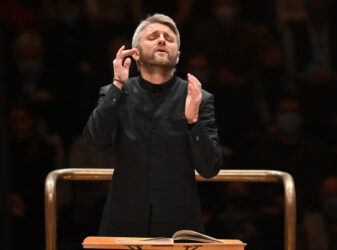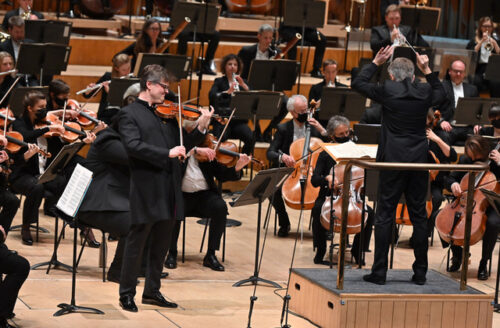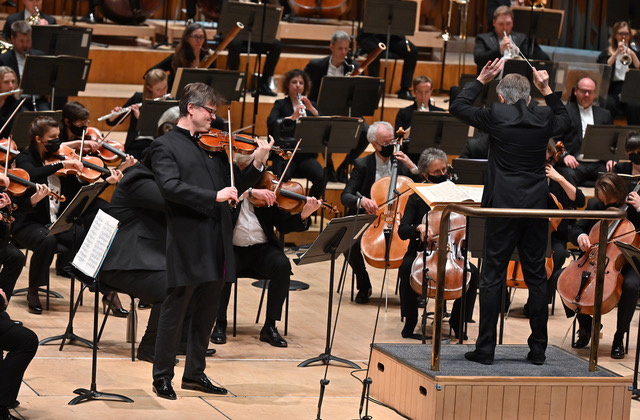 United Kingdom Rózsa, Bartók: Roman Simovic (violin), London Symphony Orchestra / Kirill Karabits (conductor). Barbican Hall, London, 9.12.2021. (MBr)
United Kingdom Rózsa, Bartók: Roman Simovic (violin), London Symphony Orchestra / Kirill Karabits (conductor). Barbican Hall, London, 9.12.2021. (MBr)

Miklós Rózsa – Violin Concerto Op.24
Bartók – Concerto for Orchestra
Pairing one of the twentieth century’s most played orchestral warhorses with one of its least played violin concertos and you have the recipe for either a magnificent concert – or something else entirely. It was very much the former.
Actually, it may have been the unfamiliar which overwhelmed the familiar on this occasion. Two exiled Hungarian composers who had been commissioned to compose works by two exiled Russians – a violinist and a conductor formed the basis of what, today, might be considered a short programme – but what a mightily virtuoso one it was.

Roman Simovic, one of the London Symphony Orchestra’s concertmasters – like many a great orchestra these days they have several of them – was the soloist in Miklós Rózsa’s Violin Concerto Op.24, a work commissioned by Jascha Heifetz in 1953. Some of the concertos that Heifetz commissioned have now become staples of the repertoire – the Walton, the Korngold; and these are unquestionably great works. The Rózsa, however, is a wonderful, brilliant concerto that, although in recent years has seen a number of new recordings, has had almost no concert performances that I can recall. Heifetz recorded it; played it in concert at its premiere. And never touched the work again. Only Bach’s E major Concerto suffered worse treatment in Heifetz’s repertoire – he played it just once in his entire career.
Heifetz may have bitten off more than he could chew with the Rózsa. Even though he was always asked for his own input into the concertos that were commissioned for him – rarely were these composers violinists (though Korngold had been, I think – Korngold was almost Mozartian in his genius). If there is any reason why the Rózsa is neglected, however, it is probably because of its incredible technical difficulty; there is no artistic reason why the work should not attract the greatest soloists. It made perfect sense for the LSO’s press office to sit me so close to the platform simply so I could see how formidably difficult the work is, however.
It is true that the Rózsa is a slightly more derivative sounding concerto than either the Korngold (which actually sounds more like some of his film scores) or the Walton (which is more original than either concerto). The influence of Britten, in slight touches of the orchestration, and Prokofiev (more the First, than the Second) are subtly infused throughout the work but you won’t find much that will direct you towards Rózsa’s grand, epic film scores, either. The Lento cantabile, for example, is extraordinarily inward-looking and rich in its lyricism – no Ben Hur there; the first movement, such a powerful and restless statement that is vividly projected with almost every technical challenge possible – including a cadenza of phenomenal difficulty – is also imbued with a clever interplay between instruments that recalls Rachmaninoff – the violinist and the clarinet; the subtle colours between the soloist and the viola, the clever use of harps. This can sometimes come across as a more orchestral concerto than others – it couldn’t be further away from the Beethovenian model.
Rózsa loves his percussion – you will hear them at the beginning of the first movement in a muffled form; they become much more pronounced during the final movement, an Allegro vivace that is both dark and a battle between the soloist and the orchestra. It is the closest Rózsa ever comes to the cinema. Heifetz probably wanted the dramatic ending, the first time you really get sustained pizzicato on the instrument, although you have heard it in the orchestra. It is fiery; it is passionate – it is Tchaikovsky on steroids. And you could not have asked for a better advocate than Roman Simovic throughout the entire concerto. The work very much suits his Ukrainian temperament and his mastery of the concerto’s technical challenges was exceptional. I cannot recall being so mesmerised by a performance for a very long time. It very much deserves a recording by him, the LSO and conductor Kirill Karabits – superb accompanists – and if this does not correct the unwarranted neglect of this superb concerto, I am not sure what will.
The second work on the program was Bartók’s Concerto for Orchestra. I am probably an outlier when it comes to this work – although I can assure you not the only one – in that I find it extraordinarily dull. The work is uneven – although there is no question that Karabits and the LSO gave a virtuoso performance of it. I would be entirely happy hearing this work with just the Introduction and Finale (ironically, one of the movements Bartók was not entirely happy with after its first performance). Some of the work recalls Shostakovich’s Seventh Symphony – the problem being Shostakovich did it better no matter how parodic Bartók thinks it ought to be. The question isn’t really how banal the Shostakovich is, but how banal the Bartók becomes – deliberate or otherwise. Either way – I can rarely hear it without becoming tired of it.
The saving grace of the performance was the playing of the orchestra and the conducting of Karabits. The LSO sound wonderful these days – and with the instruments placed as they were on stage (much as Furtwängler laid out the Berlin Philharmonic Orchestra) both the sound of the work and the instruments came across as somewhat revelatory. Perhaps because the cellos were faced towards me I would inevitably hear them better – but what a glorious sound, possibly finer than any I have heard since the Czech Philharmonic’s several years ago at the BBC Proms. Dark, rich, brawny they were hugely impressive.
Replacing the Covid-afflicted Sir Simon Rattle, Karabits himself is fascinating to watch. He works from a score, but with the most expressive batonless hands. He almost buries his head entirely into the score then suddenly jumps from it as if on a spring with very precise hand movements knowing exactly where in the orchestra he is pulling the sound from. The performance worked precisely because of this, although the energy expended – during the furious string passages in the moto perpetuo section and the exhilarating ending – suggested the wisdom of a conductor who may well have never managed to achieve such precision or excitement if he had used a baton.
An entirely memorable concert which was recorded for Marquee TV and will be available from 20 January 2022 if you have access to it.
Marc Bridle

“It is true that the Rózsa is a slightly more derivative sounding concerto than either the Korngold (which actually sounds more like some of his film scores)…”
“Sounds more like some of his film scores”? Korngold cobbled together much of the concerto from themes taken from his film scores, which is also true of his Symphony in F. Unlike Rózsa, who endeavored to keep his film work and music for the concert hall separate, Korngold was not at all shy about utilizing material he’d written for the screen in his concert works.
[Edited]